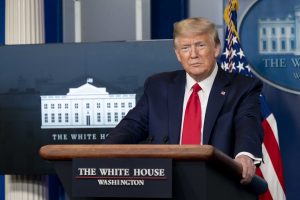On Wednesday, U.S. President Donald Trump signed into law the Uyghur Human Rights Policy Act of 2020. The bill authorizes the imposition of U.S. sanctions against Chinese officials responsible for the detention and persecution of Uyghurs, a Turkic, Muslim ethnic group predominantly residing in the Xinjiang autonomous region in western China.
The Chinese government has long had concerns about the Uyghurs’ religious and ethnic ties to neighboring states, as well as spates of violence against government workers and civilians over the years. However, the latest Beijing-directed crackdown, which dates back to April 2017 according to leaked official documents, appears to be a sweeping effort to eradicate even the possibility of separatist sentiment and activity by targeting Uyghur cultural identity itself. Many reports describe arbitrary detentions, forced labor in nearby factories, forced loyalty pledges to the Chinese Communist Party and renunciation of Islam, as well as accounts of prison-like conditions with detainees subject to torture and other abuses. Estimates of detained Uyghurs range from 1 to 2 million in dozens of internment camps.
In the United States, these reports led to increasingly loud calls to take punitive action. The Uyghur Human Rights Policy Act of 2020 passed both houses of the U.S. legislature nearly unanimously in May; previous versions had been introduced last year. Under the new legislation, the U.S. government can freeze the assets of individuals and entities found responsible for human rights abuses in Xinjiang, as well as ban the identified individuals from entry to the United States. Moreover, the bill requires the submission of periodic reports to Congress on human rights abuses in Xinjiang, efforts to protect U.S. citizens and residents from harassment and intimidation by the Chinese government in the United States, China’s technology capabilities to facilitate internment and mass surveillance in Xinjiang, as well as classified reports on the scope and scale of the Chinese government’s detention and forced labor policies against Muslim minority groups.
The U.S. Department of Commerce previously blacklisted a number of Chinese entities in October 2019 and May 2020, imposing restrictions on exports and access to U.S. technology for their alleged complicity in human rights abuses in Xinjiang. U.S. officials, including Secretary of State Mike Pompeo, Vice President Mike Pence, U.S. ambassador at large for international religious freedom Sam Brownback and U.S. ambassador at large for counterterrorism Nathan Sales, have also publicly condemned China’s Xinjiang policies.
The White House announced the president’s signing of the act into law as a damaging account of Trump’s foreign policy machinations over the last several years leaked ahead the publication of former National Security Advisor John Bolton’s book. Among the alleged exchanges between Trump and China’s Xi Jinping is the U.S. president’s supposed encouragement of Beijing’s construction of internment camps in Xinjiang.
“According to our interpreter, Trump said that Xi should go ahead with building the camps, which he thought was exactly the right thing to do,” Bolton writes. Another official said something similar, “which meant we could cross repression of the Uyghurs off our list of possible reasons to sanction China, at least as long as trade negotiations continued.”
Pushback and condemnation of Beijing’s position on human rights and religious freedom have by and large been a bipartisan feature of the U.S. Congress. However, human rights concerns have not been a pillar of the United States’ China policy under the Trump administration, with the executive branch favoring a more transactional approach heavily oriented toward trade. In that context, this new bill should not be viewed as a radical shift for greater U.S.-China policy, but rather a signal that Trump is doubling down on tough talk amid not only intensifying bilateral exchanges between Washington and Beijing, but also a tense domestic political climate in the United States.

































